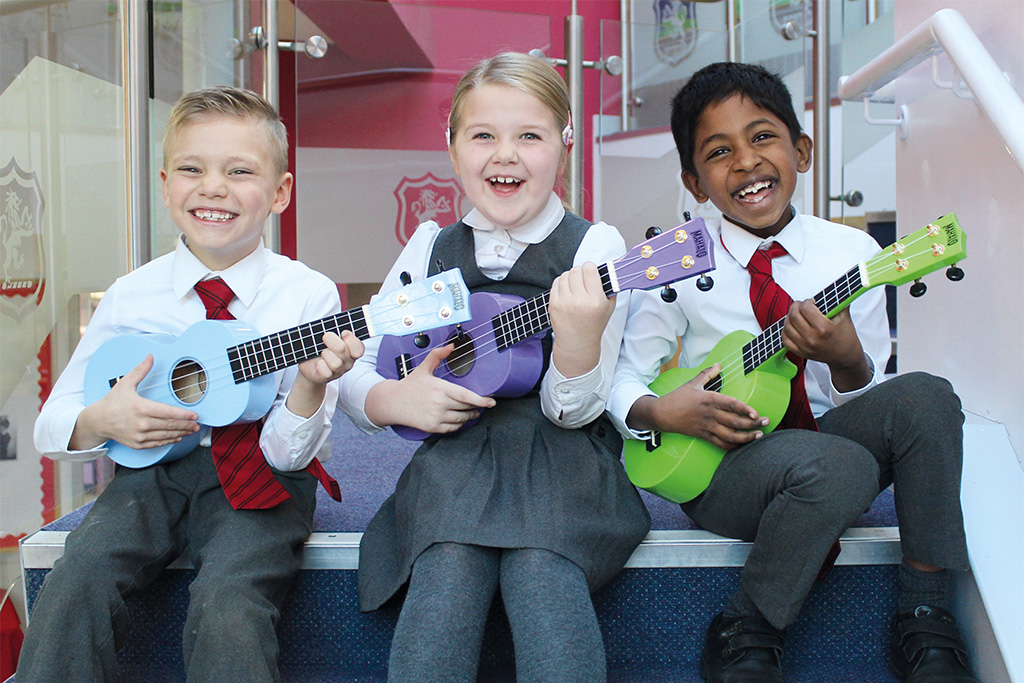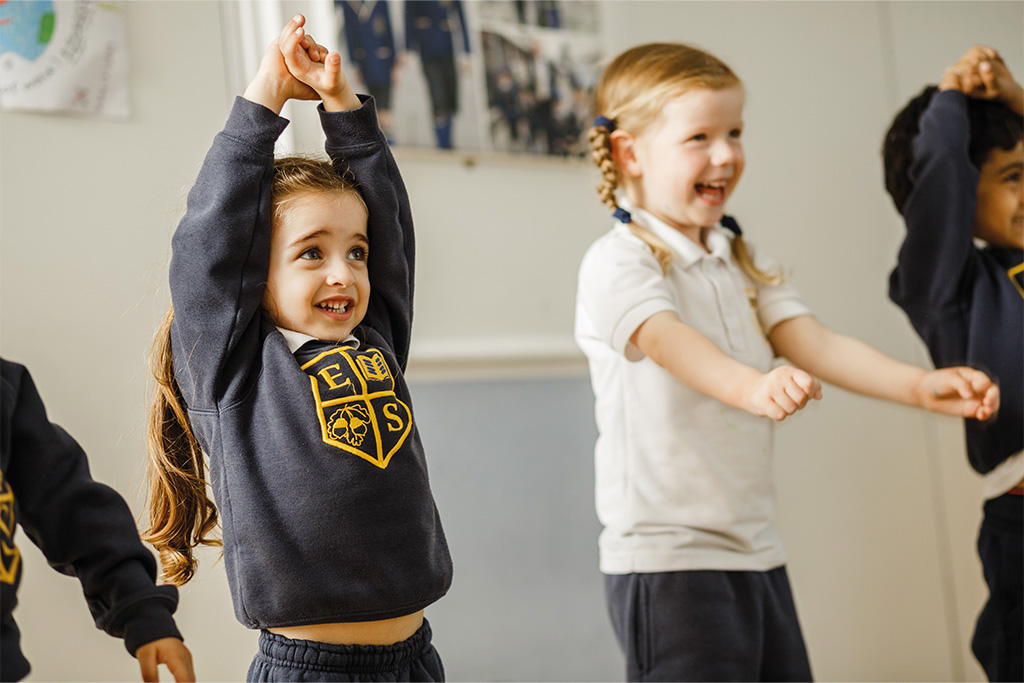Star Performers
By
3 years ago

Encouragement to explore their talents breeds confident children, says Thea Jourdan in our nursery section

Nursery schools have always been places where children can transform themselves into performers with the help of overstuffed dressing-up boxes and inspiring teachers. But there are some early years settings that stand out when it comes to producing star quality in pre-schoolers.
Shrewsbury House Pre-Prep and Nursery in Esher, Surrey make performance a part of everyday life. Recent memorable events include a special machine- and robot-themed assembly presentation to the whole school, and in front of 70 parents. ‘The 38 nursery children were all lined up on the stage,’ explains Headmaster Jon Akhurst, ‘feeding the robot letters and words they had been practising, and explaining what machines meant to them.’
Akhurst adds: ‘The high point was when they all sang a special song about various machines, composed by Director of Music Louise Forbes, though there were lots of memorable moments. It was a great way for the children to express themselves in front of an enthusiastic audience.’
When they are not receiving accolades on the stage, children at Shrewsbury House Pre-Prep and Nursery follow a curriculum that includes some form of music every day, as well as drama and dance. ‘I strongly believe that opportunities to perform help to develop self-confidence and social skills as well as balance and coordination,’ says Akhurst, ‘it’s really gratifying to see how much joy the children get from performance in front of their peers and the wider school community.’
And the children’s talents are not just confined to school grounds. Shrewsbury’s own school choir, which takes children aged four upwards, performed at the opening of the Claygate Christmas lights in recent years and headlined at the Mayor’s charity lunch attended by 50 elderly clients of the local charity in Elmbridge.
Lucy Hustler, head of Ringrose Kindergarten in Chelsea, London, agrees that performing and taking part is key to all children’s development.
‘At Ringrose we feel very strongly about how our daily songs and rhymes play an important part in children’s early literacy and language development,’ says Hustler. ‘Our weekly ballet lessons help develop their imagination and core development and we love putting on an end of year performance.’.

Singing is an integral part of the daily routine for the 40 boys and girls aged between two and five-years-old. ‘Through reciting phrases and nursery rhymes,’ she says, ‘the children are encouraged to extend their vocabulary and fluency by talking and listening and by hearing and responding to songs and rhymes. Repetition of songs, rhymes and poems establishes the basics of language in children’s minds and reinforces learning.’
She adds that the children often adopt vocabulary from songs and rhymes in their play and develop respect for each other and understand that their voice is valued. In addition, the children join in with and respond to music with a wide range of resources and percussion instruments to express their individual responses to music and rhythm.
All children participate in a weekly ballet lesson with the Chelsea Ballet School and Ringrose holds performances and parades throughout the year where the children have the opportunity to learn about customs and traditions such as Italian ‘Carnevale’ and ‘Holi’ – the ancient Hindu festival of colours, which is held in early Spring.
Performing is a skill that really matters, says Leonor Diaz Alcantara, the CEO of the Montessori Group. ‘Creativity and performance are so important to allowing children to reach their full potential, build independence and develop skills like critical thinking,’ Diaz Alcantara says.
‘We believe that every child has a particular talent and can contribute something so we encourage them to do the best they can, whether that is showing their painting to a group or singing.’ The Montessori Group help provide training and accreditation to 800 nursery schools in the UK, many of which are attached to prep schools.
Drama can also have a positive impact on a child’s language and memory skills. Whether they’re learning their line in a play or remembering where they need to stand on stage, both skills come into use. Performing a play can help children learn to follow instructions, work as a team with other children and improve concentration skills. There’s also the extra benefit of building spatial awareness – avoiding clashes with three other blossoming ballet dancers as you pirouette on stage is no mean feat – and there’s the valuable craft of letting others take turns.

At the Willow on the Farm nursery in Oxfordshire, listening is one of the most important skills that a child should learn when they first arrive at nursery aged two to five-years-old.
‘During group discussions we pass around a ‘talking object’ such as a pebble,’ says Alice Clark, who grew up on Nill Farm in Oxfordshire where the nursery is based. ‘The children very quickly learn that when they are holding the pebble, it is their turn to talk. If somebody else is holding the object and talking, then they must be respectful and listen. Every child has a voice and everyone gets a turn to have their say.’
Children have creative craft, singing and dance lessons once a week, but music is a big part of the school day in one form or another. Uniquely, being based on an arable farm which has cows, ponies and ducks, the children get to meet the animals that star in their nursery rhymes.
‘The children spend a lot of their time out on the farm whether it be in Forest School, our weekly Tractor Trailer Adventure or our Farm Walks,’ explains Clark, who set up the much loved Willow Nursery in Clapham and remains its titular Head. ‘If we spot a cow on the farm or it starts to rain, the children burst into singing a song they have learnt in the nursery.
‘We really tap into the outdoors and the varying seasons, so we explore the weather and the sound the rain makes when it lands on paper or the sound of rushing water when it runs down the drainpipes or when wading through a stream. We use natural materials to make music.’ Highlights of their outdoor music-making include the annual Forest School Spring Frolic, when the children, dressed in trademark blue boiler suits, dance, sing and perform in the woods, disguised behind their own frog masks and banging pots and pans.
Every day after lunch, the children at Willow at the Farm nursery enjoy a short Rest Your Mind session listening to calm music and then doing some breathing exercises. Breathing techniques can help with voice control and control nerves when public speaking or in an exam or interview situation in their later school life.
‘We start off sitting in a circle and just being quiet. We encourage them to listen to the world around them and encourage them to really focus on the way they breathe from the diaphragm,’ explains Clark who says she sees the transformation in children within weeks but points out the effect is life-long. ‘The children grow into unique individuals who are confident, independent, resilient and joyful at the end of their individual two-year learning journey.’ Many go on to private schools locally including the Dragon School, Kitebrook, Summer Fields and Great Tew School where they often make their mark in drama and the performing arts.

Trish Watt, Headmistress of Eaton Square Prep and Nursery Schools based in London’s Belgravia, gets to see for herself how performance and drama in the Nursery Schools positively impacts the children who go on up through the school until they leave at the end of Year 6. The three nursery classes under the Eaton Square umbrella have now relocated into the main Prep building on Eccleston Square, allowing much more collaboration between the age groups. ‘Parents and senior school headteachers do remark on how self-assured and confident our Year 6 leavers are,’ says Watt. That process is underway right from the beginning, in the nursery.’
Forty-eight boys and girls aged two-and-a-half to four occupy purpose-built spaces designed to create a calm yet stimulating environment which brings light and elements of the natural world into their learning.
‘Drama and performance start from the moment they enter the door in the morning, when they greet each other with song, to home-time when music is a call to action for tidy-up time,’ explains Watt. ‘We loosely follow the Montessori method, which puts the child at the centre of their learning, encouraging them to develop through their own interests with the teachers’ gentle guidance keeping their bodies and minds agile.’
Children are encouraged to talk to their peers about their interests and do more formal presentations, which helps them to communicate more effectively. By Year 5 and 6, they are giving professional TEDx Talks – the licensed version of the worldwide online talks which showcase speakers presenting incredible ideas in under 18 minutes. ‘We had to present lots of evidence about our work around public speaking and presentation in our application to become a TEDx centre, but we secured accreditation and can now run these online talks as another effective debating tool,’ explains Watt. ‘These sessions have seen a great deal of success, with over five million views.
Mrs Baxter, mum of Helen, 4, who is currently in the Beehive Nursery at Eaton Square, says that opportunities for performance have helped develop her daughter’s creativity and voice. ‘The teachers are very thoughtful about the range of activities they organise and Helen enjoys them all. She joined the Beehive Nursery as a quiet child and, thanks to the nurturing teaching team, she has blossomed to delight in performing. We are grateful to Eaton Square for the thoughtful, rigorous, personal approach they take to developing each child.’
See the online listing for the schools mentioned here: Shrewsbury House Pre-Prep and Nursery; Eaton Square Nursery Schools



